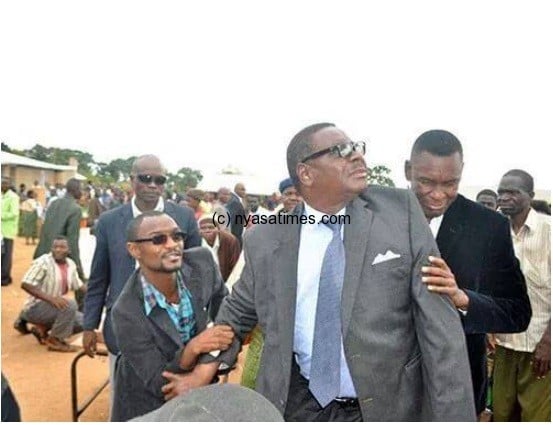With the US elections slated for November 8 this year, a recent survey has shown that 59 percent of the US electorate are already tired and worn out “by the much coverage of the campaign and elections”.

President Peter Mutharika being protected from a swarm of bees during voting day May 2014
A new Pew Research Center survey conducted June 7-July 5 found out that about six-in-ten Americans (59%) feel exhausted by the amount of election coverage, while 39% said they liked getting a lot of coverage about the election. This feeling of fatigue is particularly true among those who aren’t following news about the election very closely – 69% of this group said they are worn out compared with about 41% of those who followed the election very closely.
Voter fatigue is the apathy that the electorate can experience under certain circumstances, one of which could be that they are required to vote too often. Voter Apathy is a lack of caring among voters in an election. Voters decide that they don’t care who wins or loses. Studies have shown that voter fatigue and voter apathy greatly contribute to low turnout during polling.
The situation in the US in not isolated. It was reported in January that the EU Referendum, dubbed Brexit, date had to be delayed to June this year because of mayoral election in Britain.
Downing Street was worried a low turnout would have favoured greatly the campaign to leave the European Union because “antis” were thought to be more highly motivated.
Apart from voting frequently, voter fatigue is also blamed on lack of interest in the candidates that are running by the electorate, distrust in how elections are being run and voters believing that their vote is worthless especially in systems whereby votes do not have same power.
In the US scenario it is hard to blame the electorate. The 2016 Road to White House campaign seemed to have dragged for months. The primary process takes months. This has been blamed as a cause of voter fatigue as the electorate have to vote twice; in primary and during the general election (the popular vote). The US holds elections every four years and campaigns begins almost immediately after tallying of results.
Now scholars are advocating for reforms towards simplifying the process. Instead of going to states for primary elections, scholars are advocating for a national wide primary election. This will shorten the period the electorate are exposed to campaign messages.
To prevent voter fatigue and voter apathy, political parties and the electoral management body have to keep the voters motivated. The EMB should teach people the importance of their active participation in election. Democracy is a government of the people by the people for the people. If the people don’t participate then they are defeating democracy. The electoral body and all stakeholders must still convince the people about the relevance of government to their lives. When civic pride and passion prevail in a society, citizens will go through hell or high water to vote.
The EMB should also embrace new technologies that make it easier to register and simple and accessible, even if it means from the convenience of the home or office, to vote.
Candidates should also ensure that they deliver on their promises once ushered into office. Often the electorate have felt no need to go for vote when whoever wins will not implement or pursue policies that will result in significant advancement in their daily life. The CSOs must help to foster civic engagement between the electorate and the elected. Communities where civic engagement is high, voting is also high. Voting is one small part of civic engagement, which is a far better tool for understanding the relative health of a democracy.
Follow and Subscribe Nyasa TV :